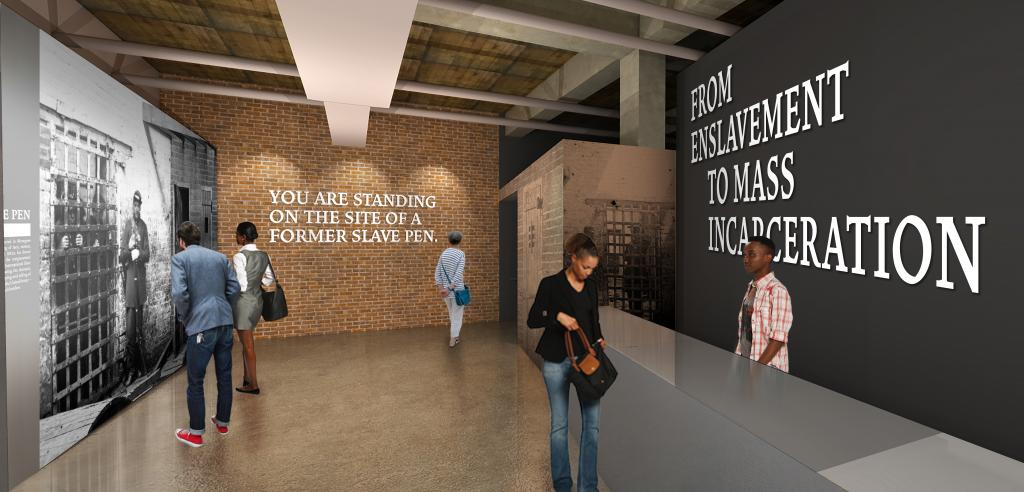MONTGOMERY, ALABAMA – The Equal Justice Initiative (EJI) plans to build a national memorial to victims of lynching and open a museum that explores African American history from enslavement to mass incarceration. Both the museum and memorial will be located in Montgomery, Alabama.
From Enslavement to Mass Incarceration will be situated within 150 yards of one of the South’s most prominent slave auction sites and the Alabama River dock and rail station where tens of thousands of enslaved Black people were trafficked. The museum will contain high-tech exhibits, artifacts, recordings, and films, as well as comprehensive data and information on lynching and racial segregation. The museum will connect the history of racial inequality with contemporary issues of mass incarceration, excessive punishment, and police violence.
The National Memorial for Peace and Justice will sit on six acres of land in Montgomery and become the nation’s first national memorial to victims of lynching. The massive structure will contain the names of over 4000 lynching victims engraved on concrete columns representing each county in the United States where racial terror lynchings took place. Counties across the country will be invited to retrieve duplicate columns with the names of each county’s lynching victims to be placed in every county.
In February 2015, EJI released Lynching in America: Confronting the Legacy of Racial Terror, a ground-breaking report that documents more than 4000 lynchings of Black people in the United States between 1877 and 1950. EJI identified several hundred more lynchings than had previously been recognized. For a copy of the full report, please contact EJI. A summary of the report is available here.
Racial terrorism forced millions of Black people to flee the South during the first half of the 20th century and played a major role in shaping the demographic geography of America by creating large Black populations in urban communities in the North and West.
The national memorial to lynching victims will be one of the nation’s most ambitious projects relating to the history of racial terror lynchings. EJI has purchased six acres of land atop a rise that overlooks the City of Montgomery and out to the American South, where terror lynchings were most prevalent.
The memorial is constructed of hundreds of floating columns on which the names of lynching victims from over 800 counties across the United States will be inscribed.
The classical structure will be surrounded by a park, where duplicate columns engraved with the names of lynching victims in each county will be placed until they are claimed by each county and permanently installed in the places where racial terror lynchings took place.
The memorial will be dynamic, and seeks to inspire local efforts to make the history of racial terror in America more visible and tangible. The memorial is being designed in partnership with MASS Design Group, an award-winning architectural firm based in Boston.
After the release of Lynching in America, EJI initiated several cultural projects designed to deepen understanding about racial terror in America. EJI is placing markers at lynching sites across the country in an effort to change the landscape of the American South, which is saturated with iconography and memorials romanticizing the Confederacy and the effort to preserve slavery.
EJI also launched a project to collect soil at lynching sites and create an exhibit that tells the stories of lynching victims. Hundreds of people have begun to actively engage in community remembrance projects around the era of lynching.
The museum, From Enslavement to Mass Incarceration, is expected to open in 2018. It is housed on the site of a former slave warehouse in Montgomery, Alabama, located midway between the former slave auction block and the main river dock and train station where tens of thousands of enslaved people were trafficked during the height of the domestic slave trade.
The museum will showcase interactive displays about America’s history of racial inequality and present dynamic information and content, including virtual reality films about the domestic slave trade, lynching, segregation and mass incarceration. The museum will house the nation’s most comprehensive collection of data on lynching.
To connect this history with contemporary issues of mass incarceration, the museum will employ narratives that reveal the racially biased administration of criminal justice, police violence, and wrongful convictions. The museum will feature new art pieces by contemporary African American artists, including Sanford Biggers and Hank Willis Thomas.
EJI has partnered with Local Projects, whose credits include the 9/11 Memorial Museum in New York City, to build the new museum, which will house reports, films, and other cultural pieces on the history of race in America.
